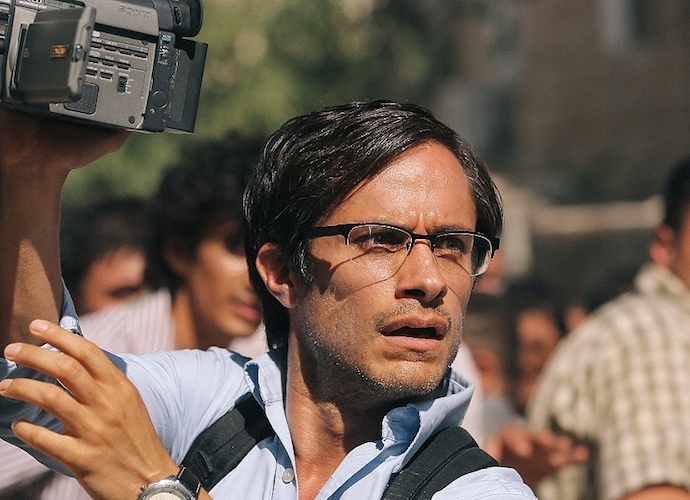‘Rosewater’ Review: Gael García Bernal Is Phenomenal In Jon Stewart’s Directorial Debut

4/5
Jon Stewart’s directorial debut, Rosewater, is clearly the work of a man who loves film and understands the changing role of media in a global society.
Rosewater is the true story of Iranian journalist Maziar Bahari, who was imprisoned in Iran shortly after appearing in a bit on Stewart’s satirical news show, The Daily Show, in 2009. Bahari, who was based in the U.K., covered the Iranian elections for Newsweek and found himself imprisoned in solitary confinement for 118 days on suspicion of being an American spy.
Gael García Bernal plays Bahari and is perfect cast in the role. As a public figure, Bernal is recognizable enough to bring audiences (and no doubt a bit of money) to the film, but not famous enough to overshadow the reality of the story and make it a film about watching an actor pretend to be tortured. Bernal’s effortless charm is perhaps one of the film’s best assets, as the audience can’t help but become attached to Behari as the film begins, with Behari getting on a plane and going home to Iran to cover the elections. Bernal has a rare ability to appear both mischievous and cautious at the same time, and Stewart wisely takes advantage of his leading man, filling the movie with close-ups and allowing the camera to linger on Bernal even when his eyes are hidden by a blindfold in prison.
Kim Bodina, who plays Bahari’s frustrated interrogator, known in the film as Rosewater, Shohreh Aghdashloo, who portrays Bahari’s mother, Dimitri Leonidas, as Bahari’s revolutionary friend Davood, and Haluk Bilginer, who plays Bahari’s father, round out the impressive cast. Bodina is particularly striking as the interrogator/torturer – a surprisingly well-rounded character given his obvious ‘otherness’ to American audiences. The strong performances come with an equally strong script, which takes care not to paint the conflicts in Iran as an ‘us’ versus ‘them’ battle. No one person in the film is squarely right or wrong. Even Rosewater, who tortures people seemingly without regret, isn’t painted as an evil force. Instead, Stewart wrote the character as a regular working man whose job happens to be torturing people. It is also worth noting that the film never touches upon Rosewater’s personal politics, or whether or not he actually believes what he’s doing.
Watching Rosewater, it’s difficult to separate the film from the filmmaker, though Stewart is careful not to put too much emphasis on his own involvement in Bahari’s story. In fact, The Daily Show itself is a passing reference in the film, given little more screentime than news clips from CNN or MSNBC. (That said, it’s true that Daily Show correspondant Jason Jones does appear in the film as himself.) Stewart’s choice not to call attention to himself in the film certainly helps audiences separate Rosewater from The Daily Show. The two could not be more different. In fact, save a few well-placed digs at New Jersey, there’s little that connects the two artistically.
Fans of The Daily Show will know that Stewart’s regular format is just that, a format – one that has been perfected to accurately poke fun at cable news. There are rarely opportunities for eloquent and unexpected camera movements or lighting, for example. In Rosewater, Stewart is able to show off more visual creativity. There are a few scenes in the beginning of the film that brilliantly blur the line between film as a mirror of reality and film as a tool for the manipulation of reality. That’s not to say most of the film is full of strange, avant-guard type techniques. In fact, a majority of the film appears to have been filmed with a handheld camera, and cinematographer, Bobby Bukowski, was able to make the film elegant, but not overly polished or precise.
Finally, the script, adapted by Stewart from Bahari’s memoir Then They Came For Me: A Family’s Story of Love, Captivity, and Survival, successfully infuses humor into the most dire of circumstances in a way that feels natural. It is also very smartly paced and incorporates media – mostly Twitter and video clips – very effectively. First time writer-director Stewart might just have a knack for this whole movie making business.
RELATED ARTICLES
Get the most-revealing celebrity conversations with the uInterview podcast!



 by
by 



Leave a comment